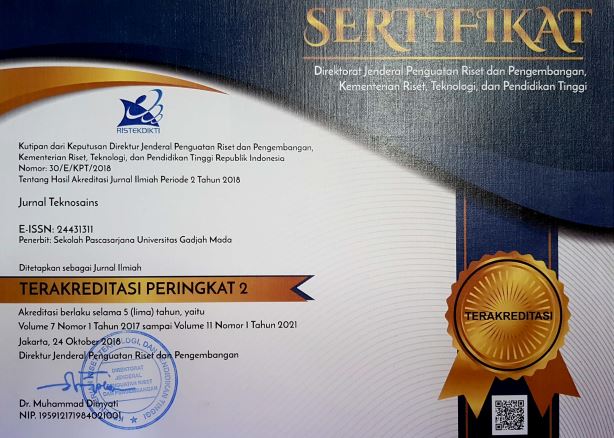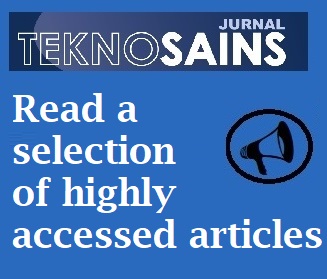Integrated microcontroller mq sensors for monitoring biogas: Advancements in methane and hydrogen sulfide detection
I Gede Artha Negara(1*), Daud Simon Anakottapary(2), Ida Bagus Gde Widiantara(3), Luh Putu Ike Midiani(4), Tjokorda Gde Tirta Nindhia(5), I Gusti Ngurah Nitya Santhiarsa(6)
(1) Bali State Polytechnic
(2) Bali State Polytechnic
(3) Bali State Polytechnic
(4) Bali State Polytechnic
(5) Udayana University
(6) Udayana University
(*) Corresponding Author
Abstract
Recent technological advances in microcontroller systems enable novel biogas monitoring capabilities. This study investigates microcontroller-based quantification of methane and hydrogen sulfide concentrations in biogas derived from anaerobic digestion. Anaerobic digesters were fed either 100% cow dung substrates or a 50:50 mixture of cow dung with municipal solid waste (MSW). Methane levels were monitored using an MQ-4 sensor, hydrogen sulfide via an MQ-136 sensor, and temperature with a K-type thermocouple, all integrated with an ATmega 2560 microcontroller system. The 100% cow dung digester produced biogas with maximum methane concentrations of 3488 ppm at 21 days, indicating improved methane production compared to the 50:50 mixture of cow dung with MSW. Hydrogen sulfide reached 195 ppm and 192 ppm for the 100% cow dung and mixed digesters. Mesophilic temperature conditions were maintained throughout the digestion process. Real-time quantification of biogas composition demonstrates the capabilities of microcontroller-based anaerobic digester monitoring to provide precise methane and hydrogen sulfide measurements.
Keywords
Full Text:
PDFReferences
[1] Zeng, X., Chen, G., Luo, S., Teng, Y., Zhang, Z. and Zhu, T. 2022. Renewable transition in the power and transport sectors under the goal of carbon-neutral in Sichuan, China. Energy Reports. Vol. 8, pp. 738–748, doi: 10.1016/j.egyr.2022.02.213.
[2] Utami, I., Riski, M. A. and Hartanto, D. R. 2022. Nuclear Power Plants Technology to Realize Net Zero Emission 2060. International Journal of Business and Management Technology. Vol. 6, no. 1, pp. 158–162, [Online]. Available: www.theijbmt.com
[3] Negara, I. G. A., Mulawarman, A. A. N. B., Santosa, I. G. and Midiani, L. P. I. 2023. Studi Eksperimental Generator Elektrik Berbahan Bakar Biogas Guna Mendukung Net Zero Emission. Jurnal Rekayasa Mesin. Vol. 14, no. 2, pp. 689–700, 2023, doi: 10.21776/jrm.v14i2.1431.
[4] Kabeyi, M. J. B. and Olanrewaju, O. A. 2022. Technologies for biogas to electricity conversion. Energy Reports. Vol. 8, pp. 774–786, doi: 10.1016/j.egyr.2022.11.007.
[5] Nindhia, T. G. T., McDonald, M. and Styles, D. 2021. Greenhouse gas mitigation and rural electricity generation by a novel two-stroke biogas engine. Journal of Cleaner Production. Vol. 280, p. 124473, doi: 10.1016/j.jclepro.2020.124473.
[6] Zabed, H. M., Akter, S., Yun, J., Zhang, G., Zhang, Y. and Qi, X. 2020. Biogas from microalgae: Technologies, challenges and opportunities. Renewable and Sustainable Energy Reviews. Vol. 117, no. January, 2020, doi: 10.1016/j.rser.2019.109503.
[7] Feiz, R., Johansson, M., Lindkvist, E., Moestedt, J., Påledal, S. N. and Ometto, F. 2022. The biogas yield, climate impact, energy balance, nutrient recovery, and resource cost of biogas production from household food waste—A comparison of multiple cases from Sweden. Journal of Cleaner Production. Vol. 378, no. September, 2022, doi: 10.1016/j.jclepro.2022.134536.
[8] Lindfors, A., Hagman, L. and Eklund, M. 2022. The Nordic biogas model: Conceptualization, societal effects, and policy recommendations. City and Environment Interactions. Vol. 15, no. June, p. 100083, 2022, doi: 10.1016/j.cacint.2022.100083.
[9] Haryanto, A., Triyono, S. and Wicaksono, N. H. 2018. Effect of hydraulic retention time on biogas production from cow dung in a semi continuous anaerobic digester. International Journal of Renewable Energy Development. Vol. 7, no. 2, pp. 93–100, 2018, doi: 10.14710/ijred.7.2.93-100.
[10] Obileke, K., Mamphweli, S., Meyer, E. L., Makaka, G., and Nwokolo, N. 2020. Design and Fabrication of a Plastic Biogas Digester for the Production of Biogas from Cow Dung. Journal of Engineering. Vol. 2020, pp. 1–11, 2020, doi: 10.1155/2020/1848714.
[11] Singh, S., Hariteja, N., Sharma, S., Raju, N. J. and Prasad, T. J. R. 2021. Production of biogas from human faeces mixed with the co-substrate poultry litter & cow dung. Environmental Technology & Innovation. Vol. 23, no. April, 2021, doi: 10.1016/j.eti.2021.101551.
[12] Negara, I. G. A., Anakottapary, D. S., Midiani, L. P. I., Temaja, I. W. and Santosa, I. D. M. C.. 2023. Experimental Study of Cooling Performance and Electrical Parameters in a Microcontroller-Driven Inverter AC System. Vol. 23, no. 2, pp. 81–90.
[13] Llano, T., Arce, C. and Finger, D. C. 2021. Optimization of biogas production through anaerobic digestion of municipal solid waste: a case study in the capital area of Reykjavik, Iceland. Journal of Chemical Technology and Biotechnology. Vol. 96, no. 5, pp. 1333–1344, 2021, doi: 10.1002/jctb.6654.
[14] Norouzi, O. and Dutta, A. 2022. The Current Status and Future Potential of Biogas Production from Canada’s Organic Fraction Municipal Solid Waste. Energies. Vol. 15, no. 2, doi: 10.3390/en15020475.
[15] Anukam, A., Mohammadi, A., Naqvi, M. and Granström, K. 2019. A review of the chemistry of anaerobic digestion: Methods of accelerating and optimizing process efficiency. Processes. Vol. 7, no. 8, pp. 1–19, doi: 10.3390/PR7080504.
[16] Meegoda, J. N., Patel, B. Li, K. and Wang, L. B. 2018. A review of the processes, parameters, and optimization of anaerobic digestion. International Journal of Environmental Research and Public Health. Vol. 15, no. 10, doi: 10.3390/ijerph15102224.
[17] Náthia-Neves, G., Berni, M., Dragone, G., Mussatto, S. I. and Forster-Carneiro, T. 2018. Anaerobic digestion process: technological aspects and recent developments. International Journal of Environmental Science and Technology. Vol. 15, no. 9, pp. 2033–2046, doi: 10.1007/s13762-018-1682-2.
[18] Morales-Polo, C., del Mar Cledera-Castro, M. and Yolanda Moratilla Soria, B. 2018. Reviewing the anaerobic digestion of food waste: From waste generation and anaerobic process to its perspectives. Applied Sciences. Vol. 8, no. 10, doi: 10.3390/app8101804.
[19] Bharathiraja, B., Sudharsana, T., Jayamuthunagai, J., Praveenkumar, R., Chozhavendhan, S. and Iyyappan, J. 2018. Biogas production – A review on composition, fuel properties, feed stock and principles of anaerobic digestion. Renewable and Sustainable Energy Reviews. Vol. 90, no. April, pp. 570–582, 2018, doi: 10.1016/j.rser.2018.03.093.
[20] Zwain, H. M., Nile, B. K., Faris, A. M., Vakili, M. and Dahlan, I. 2020. Modelling of hydrogen sulfide fate and emissions in extended aeration sewage treatment plant using TOXCHEM simulations. Scientific Reports. Vol. 10, no. 1, pp. 1–11, doi: 10.1038/s41598-020-79395-8.
[21] Tirta Nindhia, T. G., Surata, I. W. and Wardana, A. 2017. The effect of biogas desulfurization to acidity of lubricant oil of the biogas fuelled engine. IOP Conference Series: Materials Science and Engineering. Vol. 201, no. 1, 2017, doi: 10.1088/1757-899X/201/1/012021.
[22] Yang, S., Liu, Y., Wu, N., Zhang, Y., Svoronos, S. and Pullammanappallil, P. 2019. Low-cost, Arduino-based, portable device for measurement of methane composition in biogas. Renewable Energy. Vol. 138, pp. 224–229, doi: 10.1016/j.renene.2019.01.083.
[23] Nagahage, I. S. P., Nagahage, E. A. A. D. and Fujino, T. 2021. Assessment of the applicability of a low-cost sensor–based methane monitoring system for continuous multi-channel sampling. Environmental Monitoring and Assessment. Vol. 193, no. 8, doi: 10.1007/s10661-021-09290-w.
[24] Iswanto, Ma’arif, A., Kebenaran, B. and Megantoro, P. 2021. Design of gas concentration measurement and monitoring system for biogas power plant. Indonesian Journal of Electrical Engineering and Computer Science. Vol. 22, no. 2, pp. 726–732, doi: 10.11591/ijeecs.v22.i2.pp726-732.
[25] Fasake, V. and Dashora, K. 2020. Characterization and morphology of natural dung polymer for potential industrial application as bio-based fillers. Polymers (Basel). Vol. 12, no. 12, pp. 1–16, 2020, doi: 10.3390/polym12123030.
[26] Font-Palma, C. 2019. Methods for the Treatment of Cattle Manure—A Review. Journal of Carbon Research. Vol. 5, no. 2, p. 27, doi: 10.3390/c5020027.
[27] de Nooijer, N., Gallucci, F., Pellizzari, E., Melendez, J., Tanaka, D. A. P., Manzolini, G. and van Sint Annaland, M. 2018. On concentration polarisation in a fluidized bed membrane reactor for biogas steam reforming: Modelling and experimental validation. Chemical Engineering Journal. Vol. 348, no. March, pp. 232–243, doi: 10.1016/j.cej.2018.04.205.
[28] Achinas, S., Krooneman, J. and Euverink, G. J. W. 2019. Enhanced Biogas Production from the Anaerobic Batch Treatment of Banana Peels. Engineering. Vol. 5, no. 5, pp. 970–978, doi: 10.1016/j.eng.2018.11.036.
[29] Pataro, G., Carullo, D., Bakar Siddique, M. A., Falcone, M., Donsì, F. and Ferrari, G. 2018. Improved extractability of carotenoids from tomato peels as side benefits of PEF treatment of tomato fruit for more energy-efficient steam-assisted peeling. Journal of Food Engineering. Vol. 233, pp. 65–73, doi: 10.1016/j.jfoodeng.2018.03.029.
[30] de Andrade Lima, M., Charalampopoulos, D. and Chatzifragkou, A. 2018. Optimisation and modelling of supercritical CO2 extraction process of carotenoids from carrot peels. The Journal of Supercritical Fluids. Vol. 133, pp. 94–102, doi: 10.1016/j.supflu.2017.09.028.
[31] Sakayo, N. M., Mutuku, J. N. and Ngaruiya, J. M. 2019. Design and Calibration of a Microcontroller Based MQ-4 Gas Sensor for Domestic Cooking Gas System. International Journal of Applied Physics. Vol. 6, no. 2, pp. 31–40, doi: 10.14445/23500301/ijap-v6i2p106.
[32] Kadir, A. and Kako, S. 2022. Comparative Investigation on the Quality of Sensitivity of Six Different Types of Thermocouples. Al-Rafidain Engineering Journal. Vol. 27, no. 2, pp. 117–126, doi: 10.33899/rengj.2022.132862.1157.
[33] Stams, A. J. M., Teusink, B. and Sousa, D. Z. 2019. Ecophysiology of Acetoclastic Methanogens. Biogenesis of Hydrocarbons, pp. 1–14, 2019, doi: 10.1007/978-3-319-53114-4_21-1.
[34] Negara, I. G. A., Nindhia, T. G. T., Surata, I. W., Nindhia, T. S. and Shukla, S. K. 2021. Method on utilization of low quality biogas as a fuel for 4 stroke spark ignition engine of electric generator. Key Engineering Materials. Vol. 877 KEM, pp. 147–152, doi: 10.4028/www.scientific.net/KEM.877.147.
[35] Calbry-Muzyka, A., Madi, H., Rüsch-Pfund, F., Gandiglio, M. and Biollaz, S. 2022. Biogas composition from agricultural sources and organic fraction of municipal solid waste. Renewable Energy. Vol. 181, pp. 1000–1007, doi: 10.1016/j.renene.2021.09.100.
[36] Pirzadah, T. B., Malik, B., Bhat, R. A. and Hakeem, K. R. 2022. Bioresource Technology: Concept, Tools and Experiences. John Wiley & Sons Ltd. doi: 10.1002/9781119789444.
Article Metrics
Refbacks
- There are currently no refbacks.
Copyright (c) 2024 I Gede Artha Negara et al.

This work is licensed under a Creative Commons Attribution-ShareAlike 4.0 International License.
Copyright © 2024 Jurnal Teknosains Submit an Article Tracking Your Submission
Editorial Policies Publishing System Copyright Notice Site Map Journal History Visitor Statistics Abstracting & Indexing









